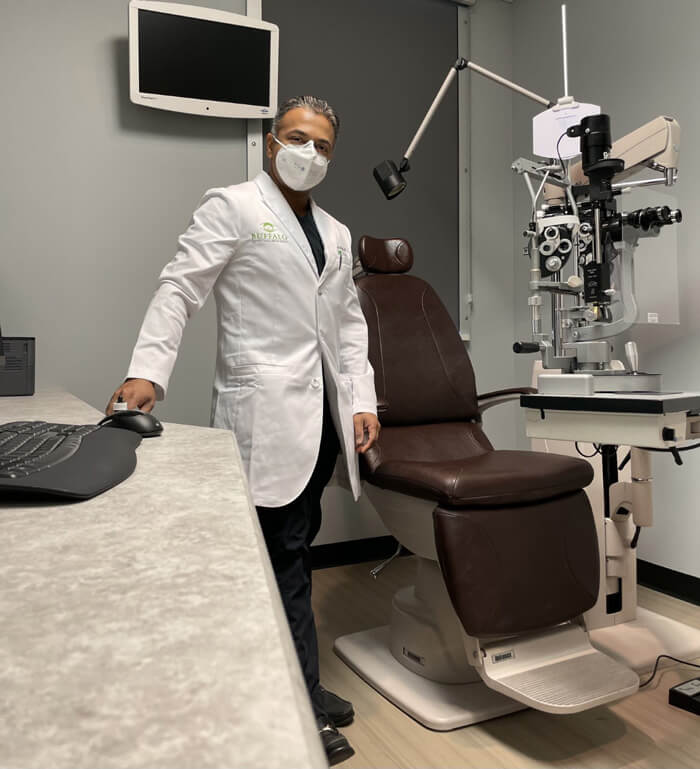All About Vision
At Buffalo Ophthalmology, we’re proud to be known as a leading ophthalmology practice in our region, and not simply because of our advanced technology and the expertise of our physicians and surgeons: it is also our commitment to patient education that sets us apart.
We want to make sure our patients are informed when it comes to their eye care, but a baseline of how our vision works is critical to understanding some of the things that can go wrong with our eyes. Read on to find out more about how our eyes function and how important it is to seek preventative care, especially if you have a family history of eye disease.
How Our Eyes Work
Our eyes work almost like a camera. Light first enters our eyes through the cornea, which is the clear front part of the eye. After this, it passes through the pupil, while the iris — or the colored part of the eye — controls how much light is let in by expanding or contracting around the pupil. This is why our pupils appear larger in darker environments, and smaller in lighter ones.
From there, the light passes through the lens, the clear inner layer behind the pupil. The retina and lens work together to bend or refract light onto the retina, an extremely sensitive layer of tissue that covers the back of the eye. Between the lens and the retina is a clear, gel-like fluid called the vitreous humor, which helps the eyeball keep its shape.
The retina is made up of millions of cells called photoreceptors, which turn the light into electrical signals that are then sent to the brain via the optic nerve. There is also a small area in the center of the retina called the macula, which is responsible for our central vision and color vision and allows us to recognize faces and fine details.
Put this all together, and you have a fascinating and complex system that results in the images we see!
What Could Go Wrong?
As you’ve just learned, our eyes are made up of several different parts working together to help us see, but this system is a delicate one. When there is a problem with one facet of the eye, it can drastically affect your sight. For example:
- The eye’s natural lens degrades over time, which leads to clouded or blurry vision, and eventually blindness. This is called a cataract and is fully treatable with cataract surgery: one of the safest and most common procedures in the world.
- There are several diseases that can affect the macula and retina, including age-related macular degeneration (AMD), diabetic retinopathy, retinal detachment, and more. These are usually very serious conditions and are, unfortunately, irreversible.
- Glaucoma is a condition where the fluid in the eye does not drain properly (which can happen for a variety of reasons), leading to increased pressure inside of the eye (intraocular pressure). This eventually damages the optic nerve and will lead to permanent blindness if left untreated.
These are only a few of the conditions that can affect the eye. They can be a result of environment, genetics, or a combination of both, but can they be prevented?
The Importance of Preventative Care
Never underestimate the importance of annual eye exams, especially if you have a family history of eye diseases. Some conditions, like glaucoma, don’t display any symptoms until permanent damage has been done to your vision, which is how glaucoma earned the nickname “the silent thief of sight.”
Some conditions, such as AMD and glaucoma, are irreversible, but their progression can be stalled or halted with proper management from experts like our physicians at Buffalo Ophthalmology if they are caught early enough.
When you undergo a comprehensive eye exam, your eye doctor will not only update your vision prescription but will also check for signs of any abnormalities in your eyes or vision. For example, they may use digital imaging technology to take a picture of your retina, measure your intraocular pressure with the “puff test,” and check your peripheral vision, the loss of which is another sign of glaucoma.
Experienced Ophthalmologists in Buffalo, NY
At Buffalo Ophthalmology, we pride ourselves on providing an exceptional patient experience, and we’re committed to addressing our patients’ needs with compassion and respect. Our advanced technology, combined with the experience of our ophthalmologists, allows us to take on even the most difficult and complex cases, including those referred to us from our local eye doctors and primary care physicians.
If you have noticed a sudden change in your vision or are struggling to manage a chronic eye condition, request an appointment at Buffalo Ophthalmology today to receive the care you deserve and ensure that nothing is being missed when it comes to your eye health.

Request Appointment
"*" indicates required fields
